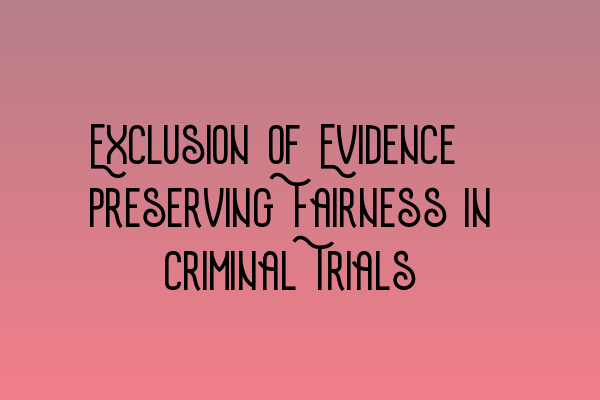Exclusion of Evidence: Preserving Fairness in Criminal Trials
When it comes to criminal trials, ensuring fairness is of utmost importance. The exclusion of evidence is a vital aspect of the criminal justice system, aimed at preserving the integrity of the trial process. In this article, we will explore the concept of exclusion of evidence and its significance in maintaining a fair trial.
What is Exclusion of Evidence?
The exclusion of evidence refers to the legal process by which certain evidence is deemed inadmissible in court. This can occur for various reasons, such as violation of the accused’s rights, improper collection or handling of evidence, or if the evidence is deemed unreliable or irrelevant to the case at hand.
Exclusion of evidence serves as a safeguard against unfairness and ensures that only admissible evidence is presented to the jury or judge. This is crucial in maintaining the integrity of the trial and ensuring that the accused is afforded a fair opportunity to defend themselves.
Reasons for Exclusion of Evidence
There are several grounds upon which evidence may be excluded in a criminal trial. These include:
- Illegally Obtained Evidence: If evidence is obtained through illegal means, such as without a proper search warrant or in violation of the accused’s rights, it may be excluded as it would be unfair to rely on evidence obtained unlawfully.
- Hearsay: Hearsay evidence, which is an out-of-court statement offered for the truth of the matter asserted, is generally inadmissible unless it falls within a recognized exception.
- Unreliable or Irrelevant Evidence: Evidence that lacks reliability or relevance to the case may be excluded, as it may unduly influence the jury or waste the court’s time.
- Privileged Communications: Certain communications, such as those between a lawyer and client or a doctor and patient, are considered privileged and protected from disclosure in court.
Impact on the Trial Process
The exclusion of evidence can have a significant impact on the outcome of a criminal trial. It ensures that only reliable and relevant evidence is presented to the trier of fact, be it a judge or jury. By excluding evidence that is in violation of the accused’s rights or lacks credibility, the trial process becomes fairer and more just.
Furthermore, the exclusion of evidence serves as a deterrent for law enforcement and other investigative agencies, encouraging them to abide by the rules and respect the rights of individuals. This promotes a stronger adherence to due process and protects the rights of both the accused and the general public.
Conclusion
The exclusion of evidence plays a crucial role in preserving fairness and integrity in criminal trials. By ensuring that only admissible and relevant evidence is presented, the rights of the accused are protected, and the trial process becomes inherently fairer. It serves as a safeguard against unjust convictions and encourages law enforcement to operate within the boundaries of the law.
To learn more about criminal law and related topics, be sure to check out these related articles:
- Legal Representation for Delaware LLCs in the UK: Expert Advice
- Ensuring Ethical Business Practices: Delaware’s Code of Conduct
- Legal Challenges for UK Businesses in the U.S.: Strategies for Overcoming Hurdles
- UK Criminal Law: An In-Depth Analysis of the British Legal System
- Legal Challenges for UK Businesses in the U.S.: Strategies for Overcoming Hurdles
